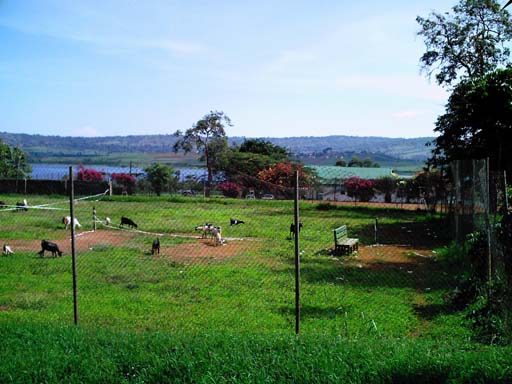
| Golf home |
Crtd 07-12-08 Lastedit 20-11-24
Jinja Club Life
"We start the financial year 2007 at the beginning of March, 2006"
Jinja Club, Uganda, bordering Lake Victoria at the Source of the Nile, established in the mid 1920's. Golf, tennis, swimming, squash.

Jinja club Southward from the road side. Foreground: tennis courts 4 and 5, on the background the Club House overlooking Napoleon Bay leading (to the right) to the source of the Nile.
The run down premises and facilities are unaltered since Ugandan independence. No doubt the club started whites only. We keep trying to find out the date of opening to everybody, a day marked, we like to think, by the mounting of the signpost below, that now features prominently at our entrance:
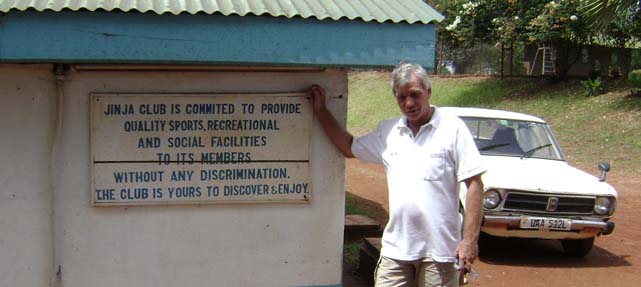
Photo: Our Signpost, and the 1985 model Datsun 1200 we use to move our mowers along the greens (mowers donated by R&A)
If it was not long after the opening to everybody that an artist was inspired to put the painting shown below on the back of the club's announcement- and competition score board, the general opening would, we think, likely have been only after independence. We all to like to think of the grey spot just above the club head at the depicted tee as a hippo.

Photo: front and back of our score and announcements board
|
We had a lot of hippo's until Idi Amin's soldiers shot them in the mid 1970's, some say for food, some say because they got trained to cross the Nile swimming and feared the beasts. Nowadays only every now and then a male from Buvuma island (10 km), chased from a group, tries his luck swimming our side and returns after being seriously annoyed by people who do not like him to graze their crops at the shore side at night. While in 1963 the South side of Napoleon bay was rain forest where from the Club's veranda you could see the elephants drinking at sunset, now all shore sides of Napoleon bay got largely stripped of trees and crowded with small fishermen-farmers.

Photo: sunset view from golf course mid sixties
Nowadays, no
hippo in his senses would try to come and raise his family here (but see a photo
of my
dhow
with hippos at Sese Island Banda 120 km SW).
Despite their prints having thoroughly disappeared since 40 years, the club
cherishes the hippo's memory by maintaining a local golf rule on the score card
until today:
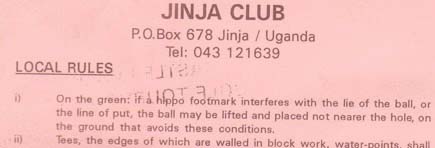
But as shown in the background of the picture below, the course nowadays enjoys more animal popularity than ever: among others, goats, cows, snakes, literally millions of big fruit bats, fruit bat hunters with catapults, fish eagles, marabous (often moving balls), scores of resting Jinjajenese, bikes, motorcycle-taxis on their way to the source, the odd car and our young self appointed club cat ("Tiger" of course) roam the fairways.
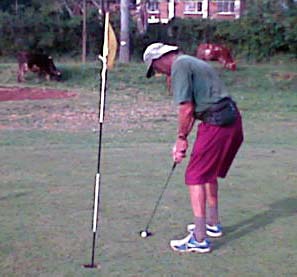
For this photo I reenact the first par I just succeeded to make on the difficult 6th hole, par 4 stroke index 2, flag put back because it makes a nicer picture. Public (background): not impressed.
Jinja club is an association with members, a board with a treasurer, an annual meeting, and staff: a financial manager, bar service, swimming pool staff, golf course maintenance staff. And it has a host of largely idle caddies, waiting for the lucky day they catch a mzungu guest player unaware that their bottom price is 80 eurocents. For the happy occasion of such visits some privately own a set of clubs for rent. Even the bartenders tried to enter the market by offering clubs for rent, but due to their incompetence got cheated when buying them (from caddies?) and are now stuck with some bags of over 30 year old dinosaurs, each number of a different brand, length and lie. At the arrival of a mzungu the peaceful rest turns into hectic running, crowding around the arrived and shouting what is on offer and at what phenomenal price. Despite the crowded impression the club thus makes, do not just set yourself on the veranda to wait for service. You are sentenced to a frantic hunt for the barman. He may be having a chat and watching the girls in the swimming pool, or has a shower, to which he claims to have the full right: "I was sweating!".
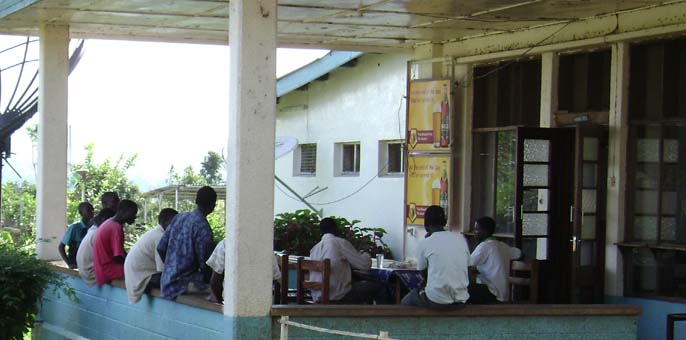
Photo: Caddies waiting for a customer on the club's veranda, many have to wait for more than a week.
The club house satellite TV is also an obvious attraction to whoever poses as caddy, the sound of which mingles with the loud disco in the swimming pool. Understandably the club's dressing room locker is not the place to store your diamond necklace. A few years ago, one caddy was sent off for breaking in lockers but got back because he was just about to become the golf champion of Uganda. There is a lot of the typical African restrained stealing: only your balls are gone but your clubs are still there. I personally found, after a stay abroad, in my locker my tennis rackets, covered with gravel dust, all with broken strings. My own padlock was still on and working but it opened a bit stiff. After another, longer stay abroad, my locker was clearly in use by another member.
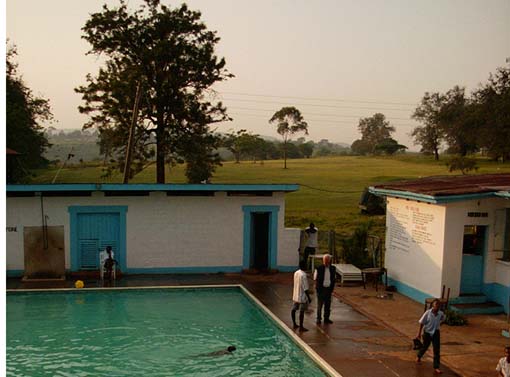
Photo: Jinja Club Swimming Pool with holes 1/9 and 7/16 and far behind
the source of the Nile
This happened last year. I am a full member (USh 100 000/= or �45 yearly), I owed
the club the membership fees of last year and the present one. Moreover, I saw I was registered for a bar debt of $10. I told the new manager that the bar debt
was due to the previous bar manager, fired for fraud - in my estimation the
average Jinja Club manager is
fired for fraud after two years - , who held, for structurally
solving the eternal "I don't have the change" problem, a small deposit of me with an
exercise book to keep track of my beers. Having been fired, he had gone off with
my money and exercise book, leaving my recent purchases in the clubs accounts as
unpaid. I had reported this to the club more than a year ago.
I shrewdly proposed to deal with all problems (debts and lost property) in one go. That
changed the matter. My golf clubs were unexpectedly found immediately. The 9 and
pitching wedge were missing, but somebody knew the man who was "repairing" the
pitching wedge. I told them I would pay my membership as soon as I would have received
both my missing clubs, my missing balls, tees and glove. The last three items
had "plobabry" (African English) been sold, but I could live with that.
Within two days, even the last two clubs surfaced. The - usually drunk - grounds
man bringing them
was so moved by his own benevolence that he wanted a reward. I gave him a dollar.
Photo: a cobra catch at tee of the 4th hole of Jinja golf course
The return of my property of course made me ready to pay two years of
membership fees.
The new manager: no, you have to pay
for three membership years.
It is February, 2006.
I show him my last fee receipt of December 2003 for the membership year 2004.
That fee had been reduced with the 18 000 USh, the non-consumed part of my
exercise-book-change-shillings the previous manager fled with.:
Yes, the new manager says. That was for the financial year 2004.
No, I say, it says "year", not financial year. But I do not mind to take it as
financial year, because I know that starts in March, hence it would give me three free
months.
But we start the financial year 2007 at the beginning of March, 2006.
I do not say anything but look at him for a while, to see whether any light gets
on. Then, he asks me to see his book. In a brand new book it is solemnly written I should pay 300 000.
Sorry, there just has been a million fraud in this club [a million is �450], I am not even going to read
its books. My receipt is my proof. Take it and discuss it with your treasurer.
I put my 200 000, two years membership
fee, back in my pocket and leave.
After five months of silence on the matter, I get an invoice for "membership 1-4-2006
to 1-4-2007", which in my calculation saves me one year's fee. This
time I decided not to object.
Through the years the quality of the golf course varies from excellent to a
state where you are not even likely to find your ball in the middle of the
fairway. Yet you feel having a free ride with your �45 annual membership
and � 0.80 green fee (Wednesdays � 1.20, Weekends and public holidays � 1.60).
Moreover, recently the course got a boost by high military attention. Fuel
surfaced, workmen could be paid, even water pipes got dug to the greens. All taps
got stolen on the day of their mounting, but they kept being replaced until even
proper night security was installed.
A fine tractor appeared on the premises, which was first thought to have come
from the army camp but later was said to have been donated by St. Andrews. An
internet surf session taught me that the donation was by R&A, the golf's
world rules and development body (yes, at St. Andrews), and our three new green
mowers had come together with it.
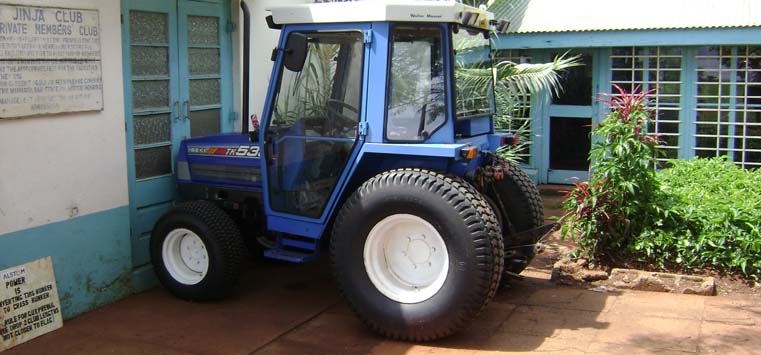
Photo: donated by the R&A body.
The Annual meetings of the club are worth a visit. They start three hours late. Not long after, the alarming unpaid claims of the club on its members are discussed, most of them bar debts. Fortunately the major share in the debts is due to members long suspended and abroad, which has the additional advantage that they cannot defend themselves. The members attending the meeting fortunately are all relatively clean but curiously enough, a cash-only policy is supported by a small minority only. The counterarguments adduced by the other members are intricate, sometimes brilliant and take about 80% of the meeting: every item on the agenda, whether it is squash, tennis or whatever, seems to naturally lead back to the subject: the features of a legitimate bar debt - guests suddenly appearing / only members of other clubs or any guests? etc. -, its exact maximum amount and duration.
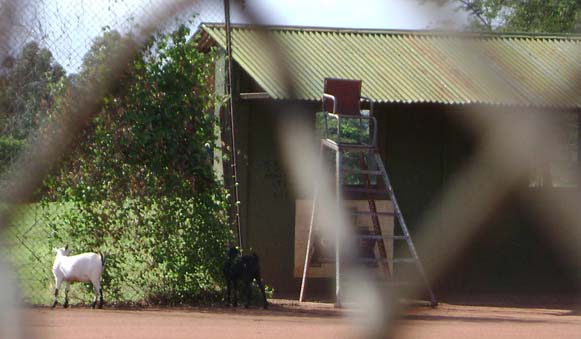
Photo: Centre Court
Golf competitions are highly emotional events since the value of prices
(varying from a video recorder to 10 kg of maize flower) is, as a percentage of
the wealth and income of competitors, so high that the stakes are almost
professional. Do not be surprised by some unexpected coughing when you tee off,
balls gone astray are found miraculously and winners are contested for wearing
clothing inconsistent with the regulations. If all that does not help some try to sneak out with prizes
they did not win.
The courtyard of the clubhouse is a most intriguing place. If you can't find it
just follow the Tiger the Club cat. Here children are running around and
women sit behind food, boiling on floor charcoal fire as you could see it in every African
country village. Who is who is not easy to grasp. Some staff live there with their
families, but since it is normal in Uganda to have many wives the place is be
impossible to survey. Three year olds come out assuming a helicopter-like
appearance by swinging full size golf clubs over
their heads, hitting fairly hard the occasional ball you like me no doubt get
tempted to drop
at the right place.
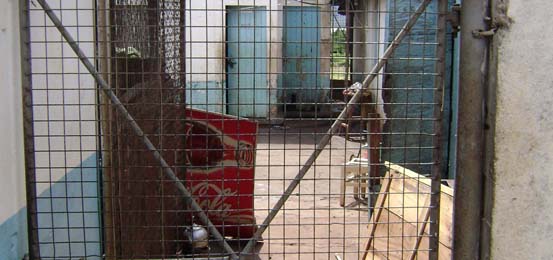
Photo: the intriguing court yard
The Club goes up and down, but nowadays we are up because of
the R&A donations and a strong presence in our board of high military: our
president, a top military officer, while signing for some expenditure: "we
do not leave shopping to others, you go yourself! I saw this guy staggering
drunk carrying our fuel!...I heard someone ran off with yesterday's money
of the swimming pool?...etc.
Jinja Club, inalienable part of the international golf heritage. The luring
danger is of course a corrupt set up in which the ground gets lost to some
project developer, but the popularity of the fairways among the many Jinja
citizens who need a rest from doing nothing all day makes local officials
reluctant to follow their temptations. Meanwhile we got proud to see a new mast
of mobile provider MTN displaying its name as "Jinja Club" on our cell phones.
Picture: Google Earth: Northward, Jinja Club (left the source of the Nile)
Breaking News: "Bart Harmminga" serves "indefinate suspension" for writing this page